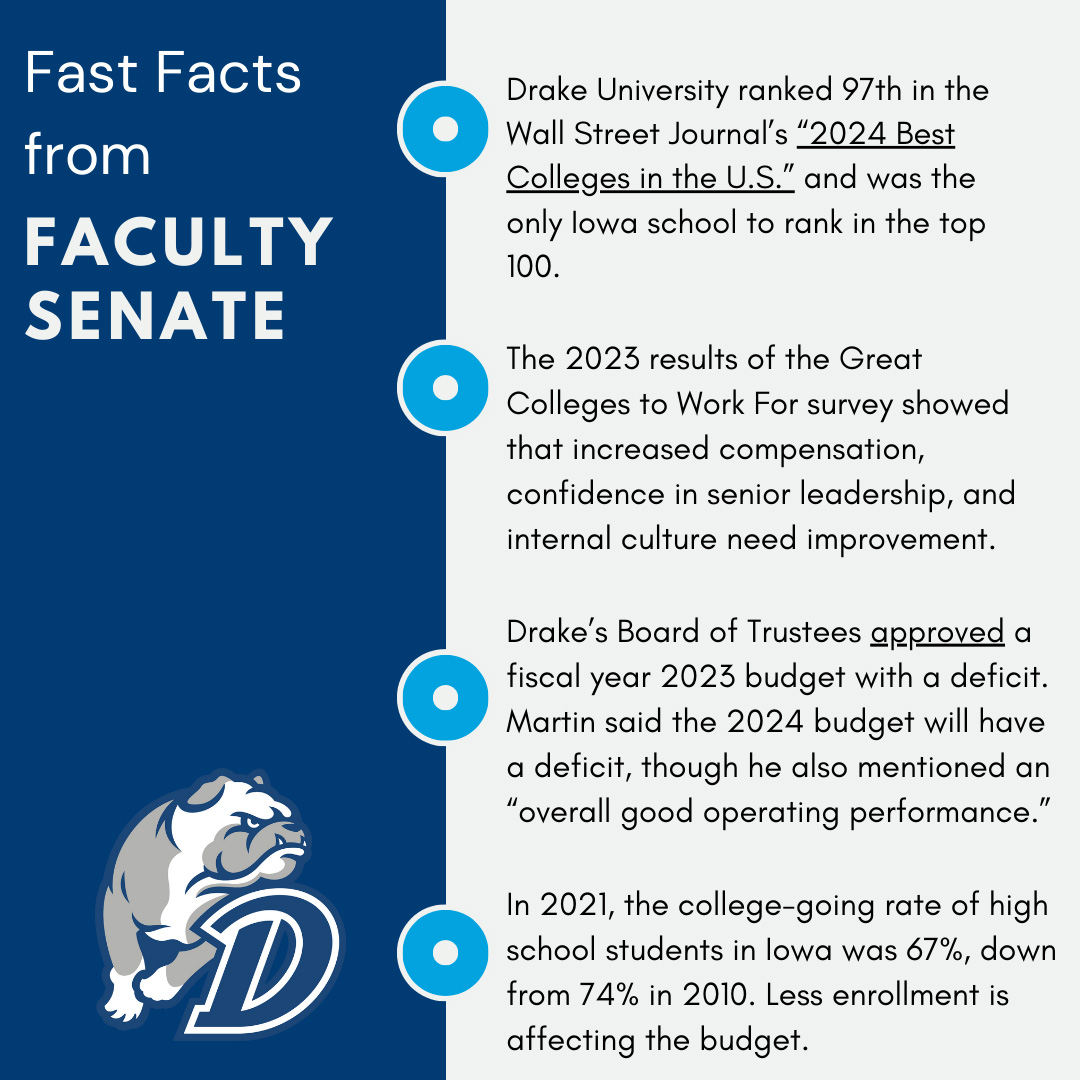Welcome to the first issue of The Times-Delphic’s Faculty Senate Digest. The TD has previously reported on topics mentioned in the Faculty Senate, such as a policy change that will reduce the number of credits January Term students can take in the spring semester without the overload fee. This Digest gives you updates about several different topics mentioned in September’s Faculty Senate meeting.
Good news
Faculty senators had the opportunity to share good news from their colleges and schools. During the Sept. 20 meeting, Senator Anisa Hansen of the College of Pharmacy and Health Sciences thanked librarians for their work on Drake’s “Blueprint for Success” course.
“Nearly all of our first-year students were able to have a tour from the library, [and] information on how to use the databases,” Hansen said. “I just thought that was fantastic, and I knew that was a lot of work. So thank you to all the librarians on the call.”
Faculty and staff share opinions through workplace survey
The 2023 results of the Great Colleges to Work For survey have been released, providing an overview of the responses from faculty and staff.
Six hundred faculty and staff participated in the survey, according to an article in the OnCampus newsletter posted by Drake Chief of Staff Nate Reagen and Human Resources Executive Director Maureen De Armond. The company that manages the survey recognized Drake as a “Great College to Work For” for “supervisor/department chair effectiveness” and “faculty & staff well-being.”
“The qualitative responses in the survey serve as a reminder of our strengths: working well with colleagues, supportive supervisors and department chairs, the flexibility to work from home and more,” Reagen and De Armond wrote.
The results also address the question: “What would make this institution a better place to work?” The leading theme in survey responses was increased compensation. In second place were senior leadership improvements such as communication, transparency, decision-making and trust.
The faculty confidence in senior leadership results stood at 38%, which the survey calls “poor.” Faculty results for collaboration and communication were at 50%, which “warrants attention.” Staff gave the University a better grade in these three areas, all above 60%.
The third-place result for improvement was internal culture. This theme included faculty to staff relations, accountability for poor performers and accountability to core values.
The OnCampus article listed three areas of collective improvement for this academic year: robust and transparent communication, professional development and annual evaluations and extending a generosity of spirit to colleagues across campus.
Anticipating a deficit budget
On Friday, Oct. 6, the budget for fiscal year 2024 will be presented to the Board of Trustees for approval, President Marty Martin said.
Drake’s Board of Trustees approved a fiscal year 2023 budget with a deficit, according to May Faculty Senate minutes. Martin said the 2024 budget will have a deficit, though he also mentioned an “overall good operating performance.”
Faculty Senate President Carrie Dunham-LaGree said the members of Drake’s President’s Council are meeting weekly to discuss the budget without Martin, in addition to a meeting every other week with the full council. The Council includes administrators and staff such as Provost Sue Mattison and Chief Financial Officer Adam Voigts.
“I’m attending those meetings. I’m doing my best to advocate on behalf of faculty at that table,” Dunham-LaGree said at the September meeting. “…As always, we welcome faculty ideas about the budget. As a reminder, if you have any ideas about growing revenue, reducing expenses…please send them my way or to the representatives on the Faculty Senate Budget Committee.”
How mental health, enrollment and the budget are connected
An increasing percentage of high school graduates are not going to college for a two or four-year degree, according to research by the Education Advisory Board.
Reagen provided The Times-Delphic with a summary of research received from the EAB. In 2021, the college-going rate of high school students in Iowa was 67%, down from 74% in 2010. During the Faculty Senate meeting, Martin spoke about enrollment and the budget while using a slideshow.
“…[This slide] just shows now all of our enrollments, full-time equivalent. And as we have seen, the line has been decreasing. The population’s been decreasing,” Martin said. “…The last two years have been very, very challenging. And so this creates that budget pressure that we all are aware of, that we’re all feeling, that we’re all managing.”
Senator Melisa Klimaszewski of the College of Arts and Sciences brought up the idea of Drake’s marketing focusing more on mental health services. Martin said Chief Student Affairs Officer Jerry Parker has traveled around the country to Drake admitted student events with a purpose of talking about this topic.
Last academic year, Drake introduced new virtual mental health services through Uwill telehealth, The Times-Delphic reported. The University also charges students a student holistic wellness fee. During the November Faculty Senate meeting, Parker said there’s an expectation for Drake to provide services.
“That is a strong recruitment tool,” Parker said. “I can tell you, [in] just about every parents’ panel I’m on, that’s one of the first two [or] three questions.”
Drake ranks in the Wall Street Journal’s top 100 U.S. colleges
Drake University ranked 97th in the Wall Street Journal’s “2024 Best Colleges in the U.S.” In an announcement, Drake said it was the highest-rated Iowa school. The University also ranked 133rd in the New York Times’ “The Top U.S. Colleges with the Greatest Economic Diversity.”
“We are expanding access and success in a whole host of different ways,” Martin said. “…You can think of Crew Scholars. You can think of [the] John D. Bright College, and I could go on down the list.”







